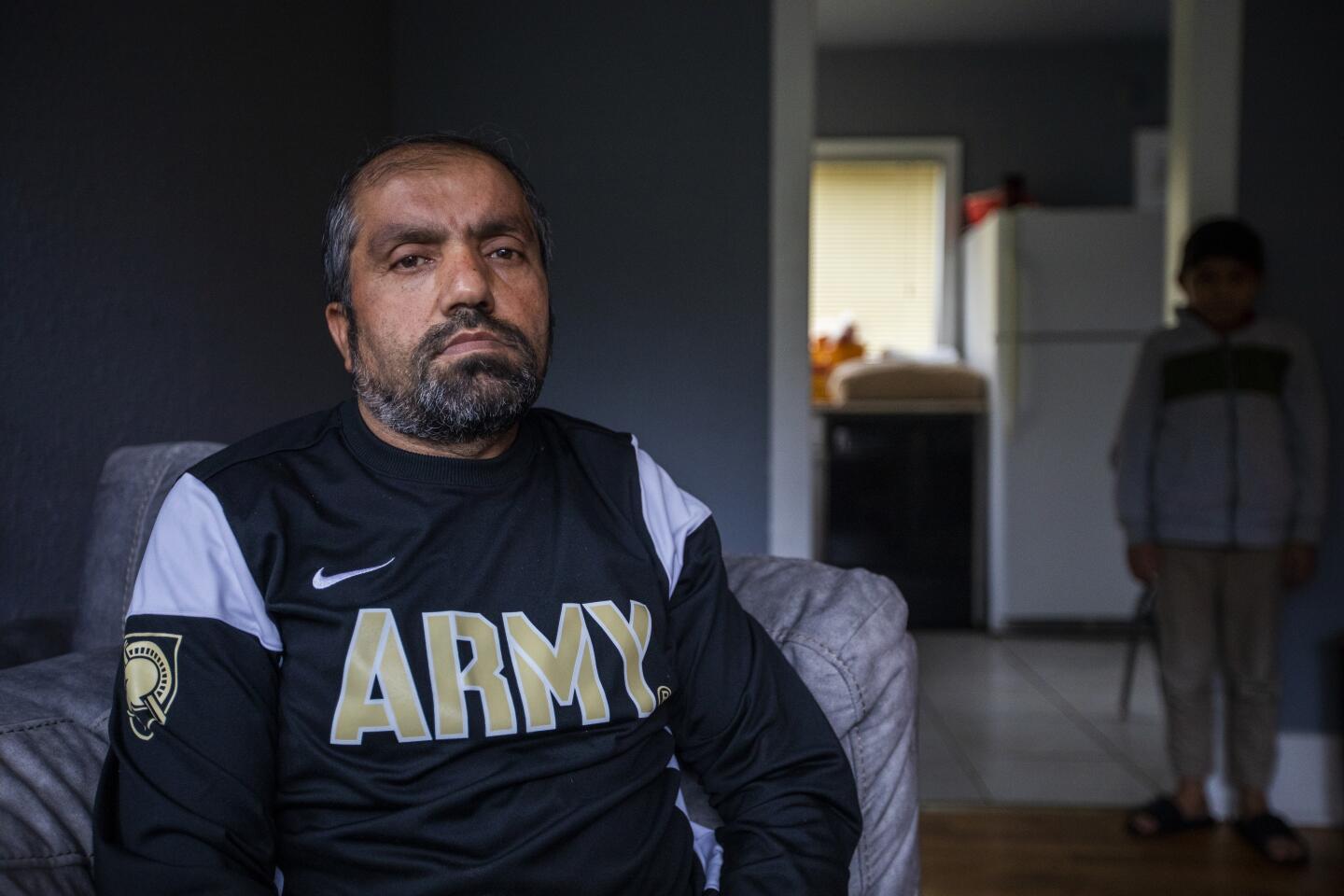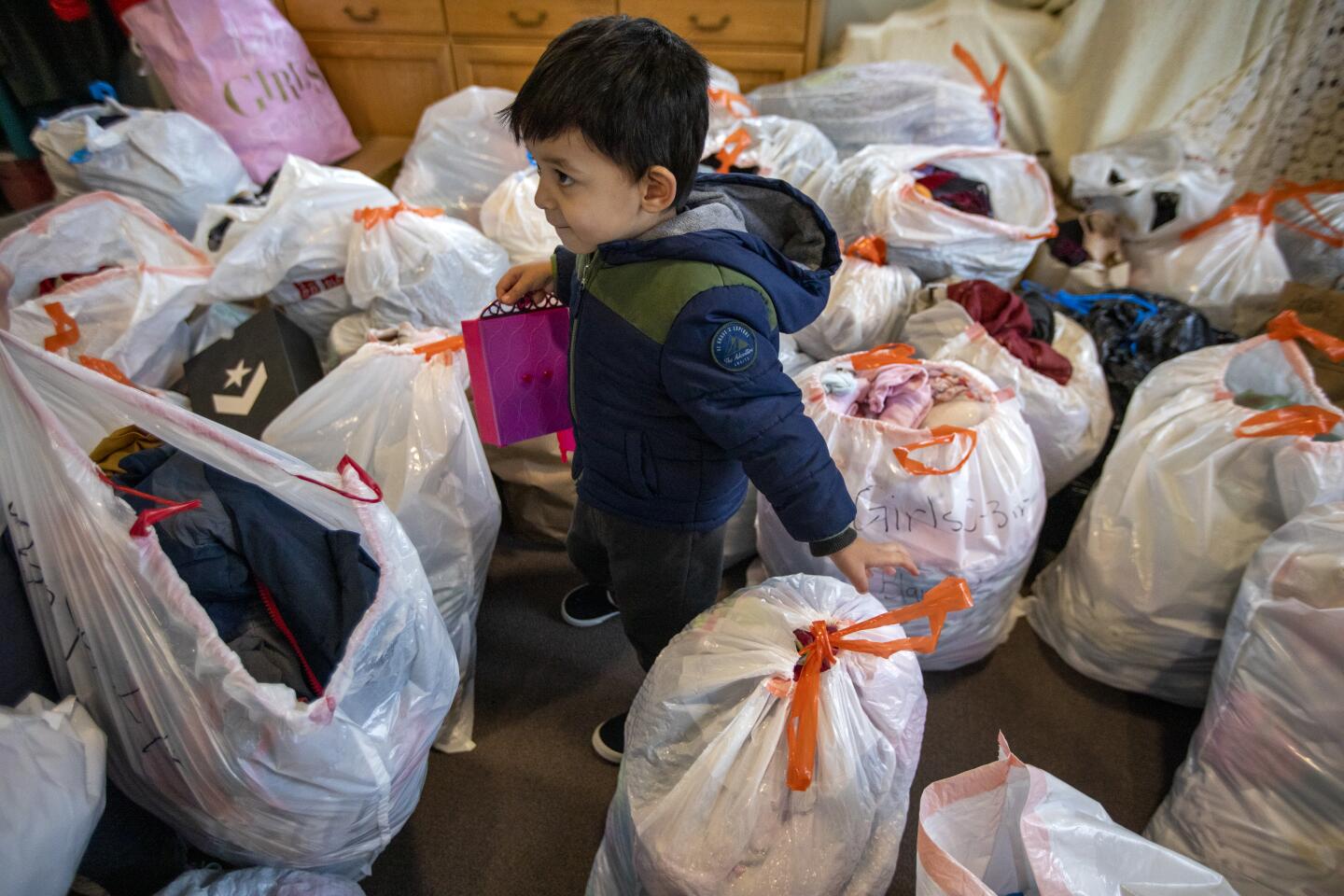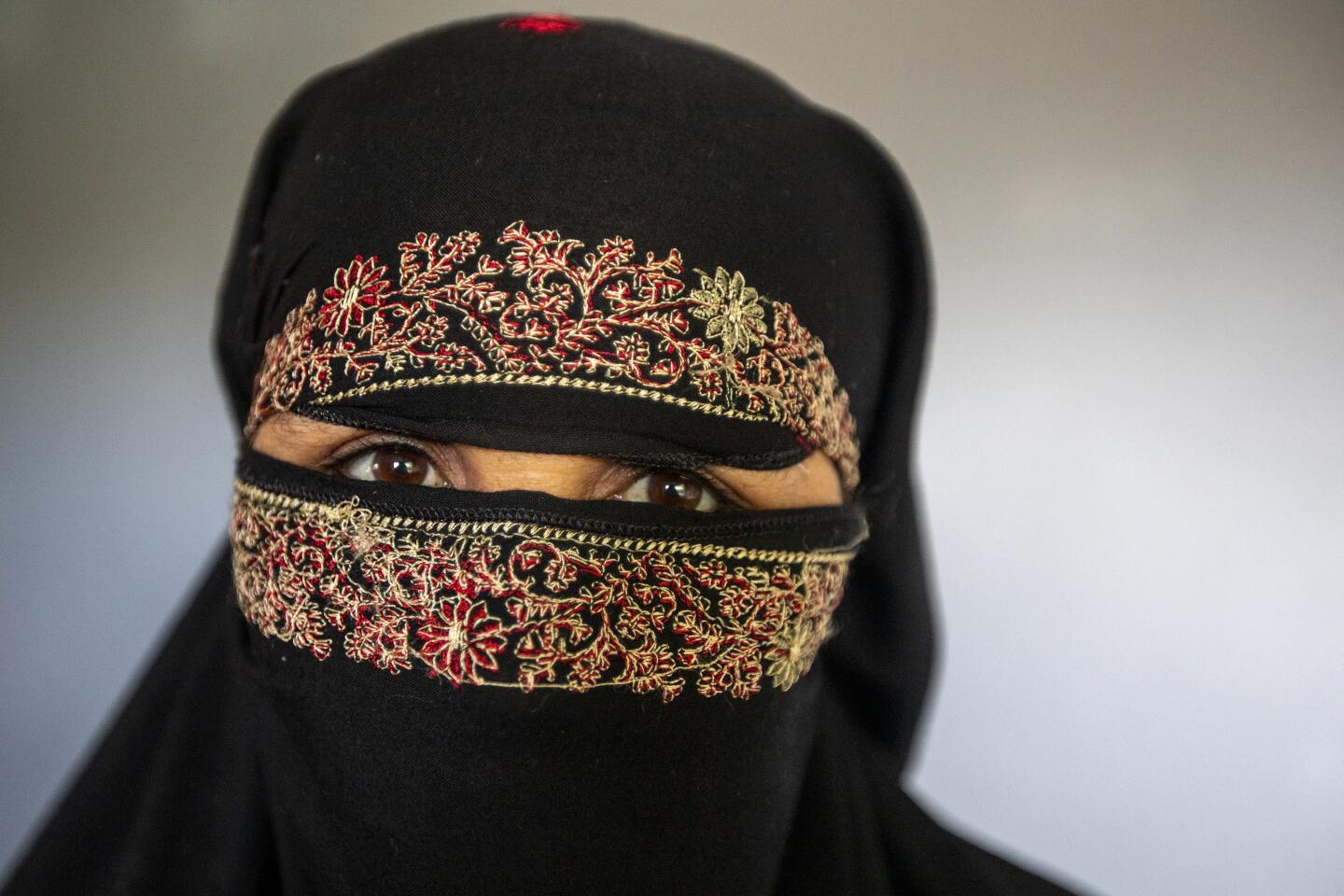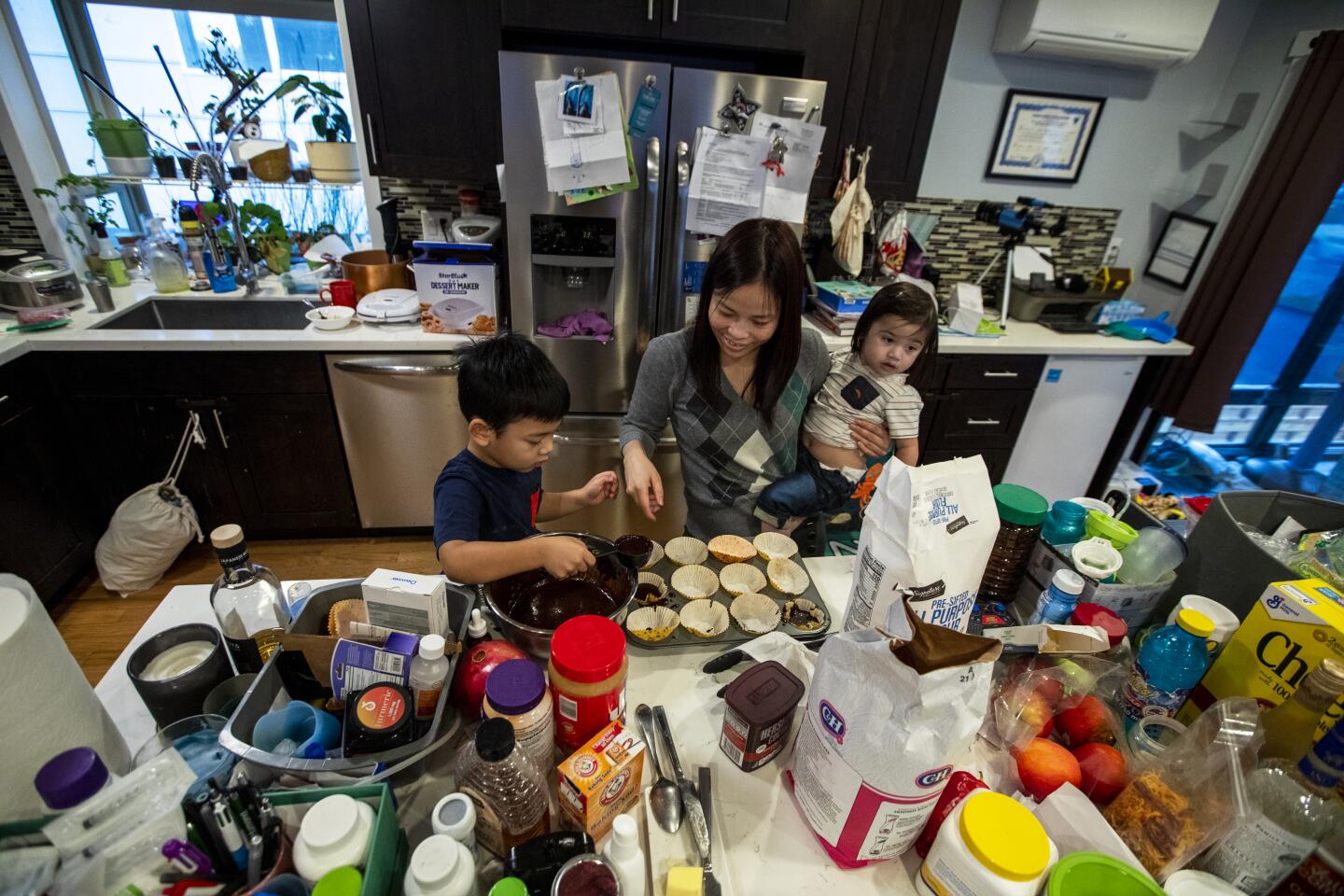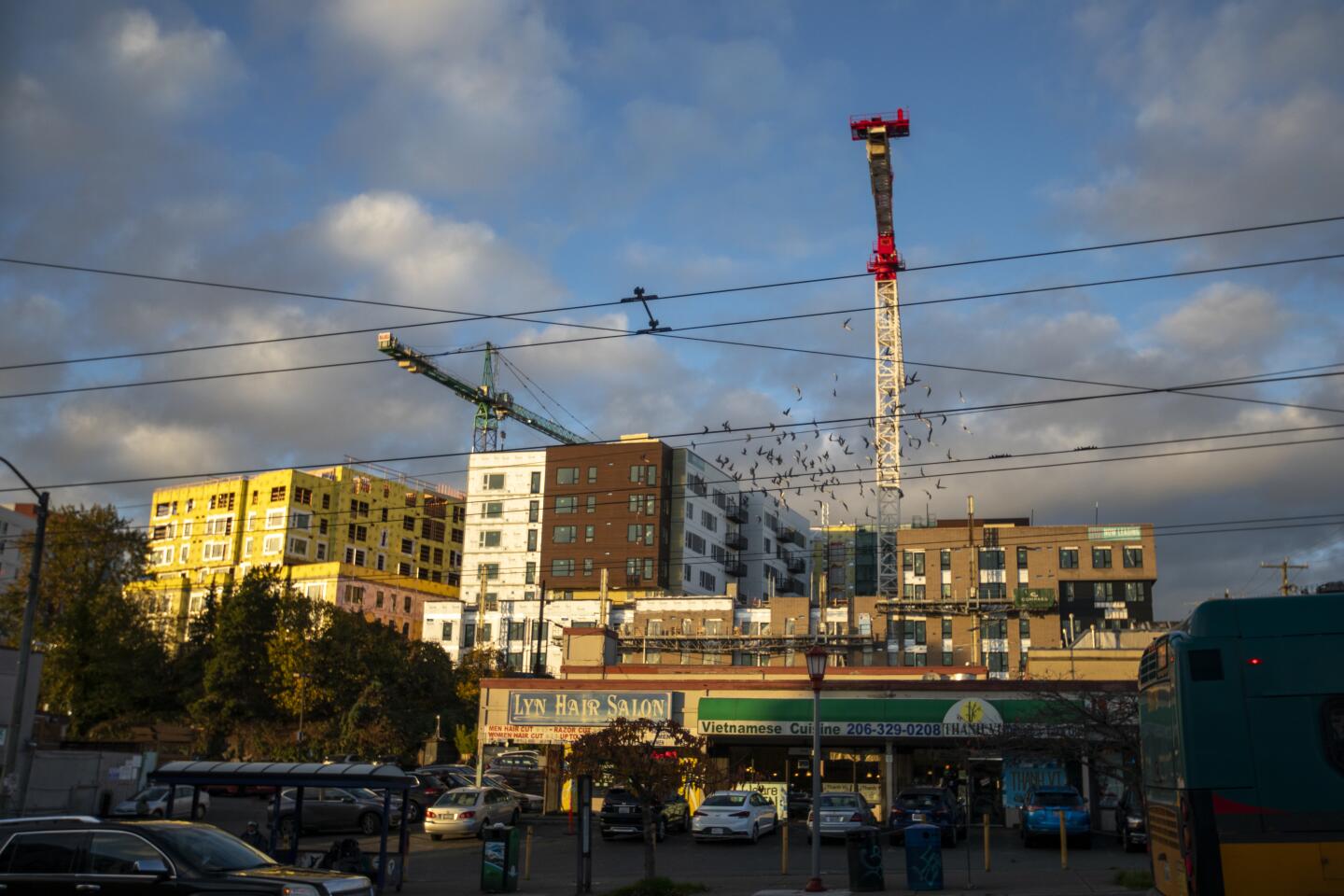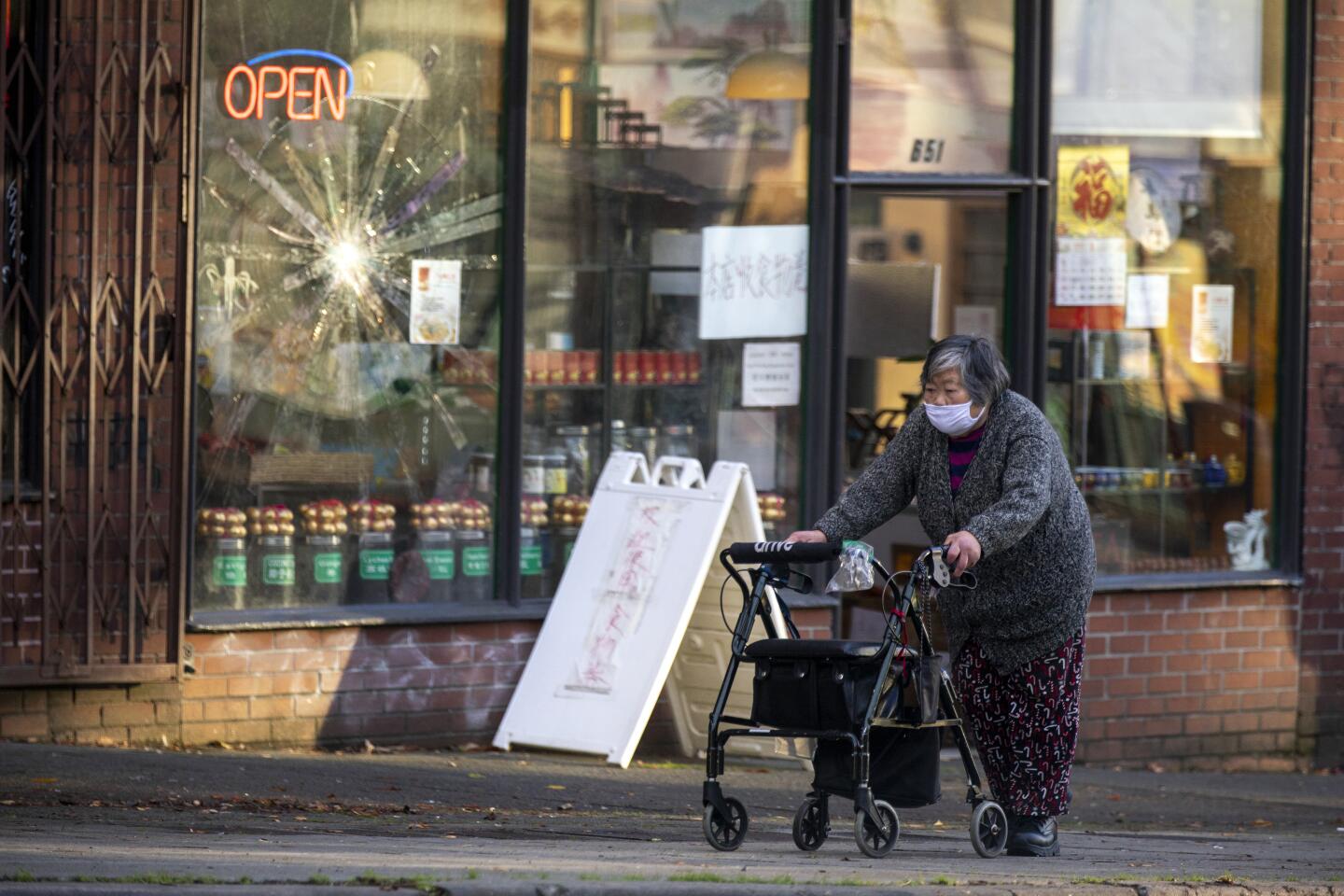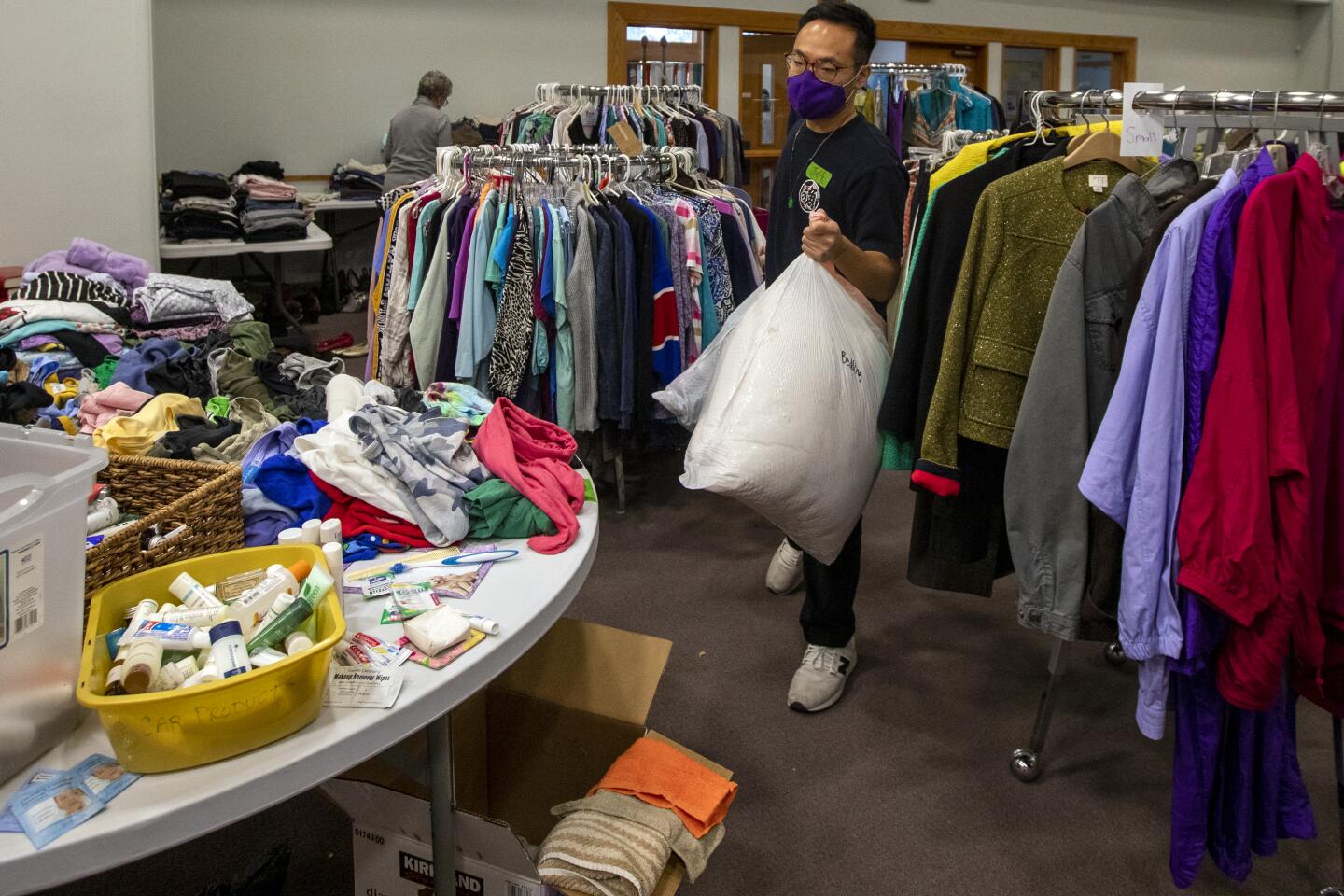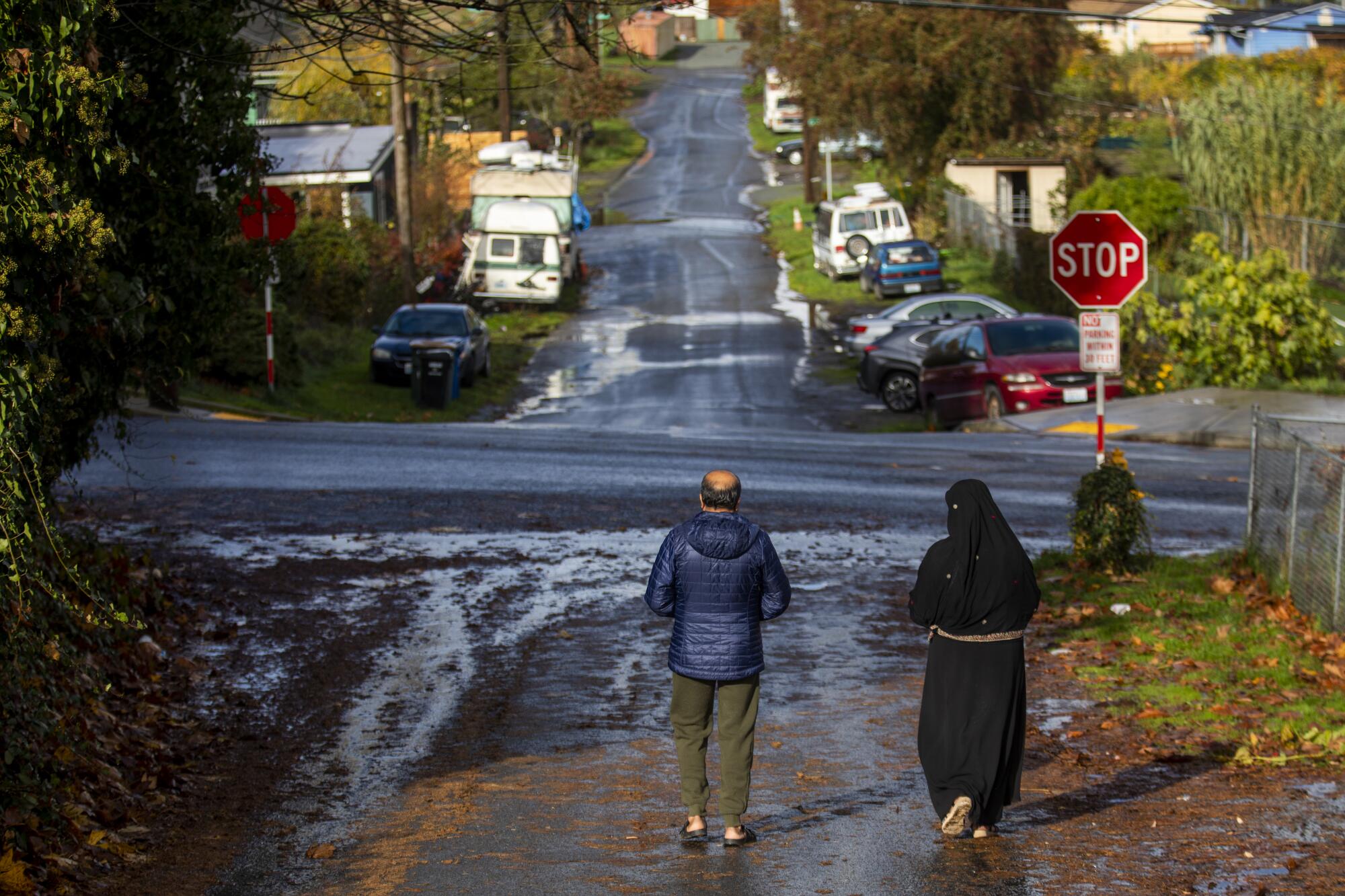
- Share via
SEATTLE — Thuy Do couldn’t look away from the devastating clip playing on a loop on television news — hundreds of Afghans running alongside a massive U.S. Air Force cargo plane, desperately trying to flee their home country. The frantic frowns felt so familiar, reminding her of images of refugees packed onto helicopters to escape Vietnam more than four decades earlier.
So during the summer, Do, a doctor in her late 30s whose family left Vietnam when she was a girl and resettled in Seattle, sat down in her living room with her husband and talked about how they could help.
“We just knew we had to do something,” she said, reflecting on the initial shock of the Taliban takeover of Afghanistan in August. “This is a time for us to give back.”
Many time zones away, past jagged mountain ranges and the vast Pacific Ocean, Abdul Matin Qadiri settled into a corner inside Hamid Karzai International Airport, where he and his wife and their four children would spend two nights waiting anxiously for an evacuation flight. As soon as word had begun to spread of the Taliban entering Kabul, the nation’s capital, Qadiri, who had worked alongside the U.S. military as a mechanic, decided to flee as soon as possible.
“It was life or death,” said Qadiri, who is in his mid-40s. “We had to get out.”
In the weeks that followed, through a process shaped by generosity, coincidence and deep understanding, the paths of Do and Qadiri — whose journeys were separated by 30 years — intersected in the place they both now call home: the Pacific Northwest.
::
The federal government, as U.S. forces withdrew from Afghanistan, has evacuated about 83,000 people to the United States, with some transported to American military bases from Texas to New Jersey to await word about where they’d begin to build new lives.
About 35,000 people remain at Department of Defense installations. But 36,000 have either obtained proper legal paperwork or have been assisted by government-approved resettlement agencies and are now housed in communities across the country, according to the U.S. Department of Homeland Security. Additional evacuees are awaiting U.S.-bound flights at military bases in the Middle East and Europe.
To augment the effort, the Biden administration recently announced a pilot program allowing groups of at least five individuals — who must, among other things, pass strict federal background checks — to apply to become “sponsor circles,” helping Afghan refugees to resettle for at least three months. The initiative is designed to supplement the efforts of resettlement agencies.
In Washington state, about 1,200 refugees have already been resettled, and Gov. Jay Inslee has announced that he expects nearly 1,700 more Afghan refugees will move to the state in the months ahead. To help prepare, resettlement groups and sponsor circles here have gone into overdrive.
Among the sponsor circles is Viets for Afghans, a grass-roots group founded by Vietnamese refugees and the children of refugees after the fall of Kabul on Aug. 15. This, members say, feels like an opportunity that’s impossible to pass up in order to pay forward the support their families once received.
“We see our families — our own loved ones — in the current situation with Afghan refugees,” said Thanh Tan, who helped start the group while participating in a series of group texts with friends.
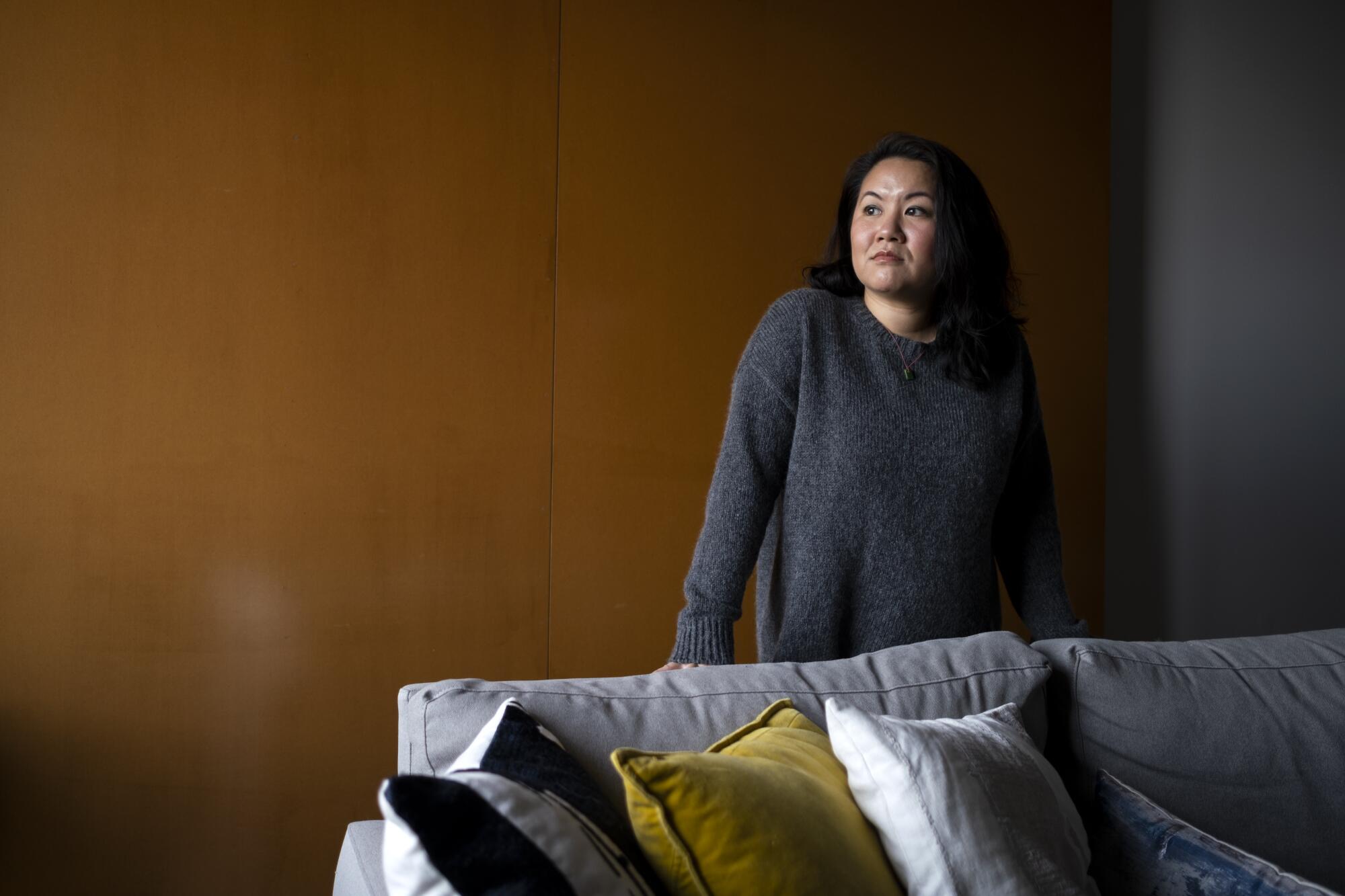
Despite age differences, the members are united in their lives having been shaped by their families’ departure after American troops withdrew from what was then South Vietnam in 1975. They are bonded by memories and stories of struggle, of arriving in a new country with few resources and options, and surviving in part due to the kindness of strangers. Each has relatives who escaped by boat, part of a humanitarian crisis in which 800,000 Vietnamese fled over a span of two decades.
Tan’s parents and oldest sister fled Vietnam by boat in 1978, three years after U.S. forces pulled out of the country, and the capital, known then as Saigon, fell to the North Vietnamese army.
The relatives slept in wooden shacks in a refugee camp in Malaysia for six months, eating rationed red beans and rice before being resettled in Olympia, Wash.
“My family was fortunate to arrive here when they did,” said Tan, 40.
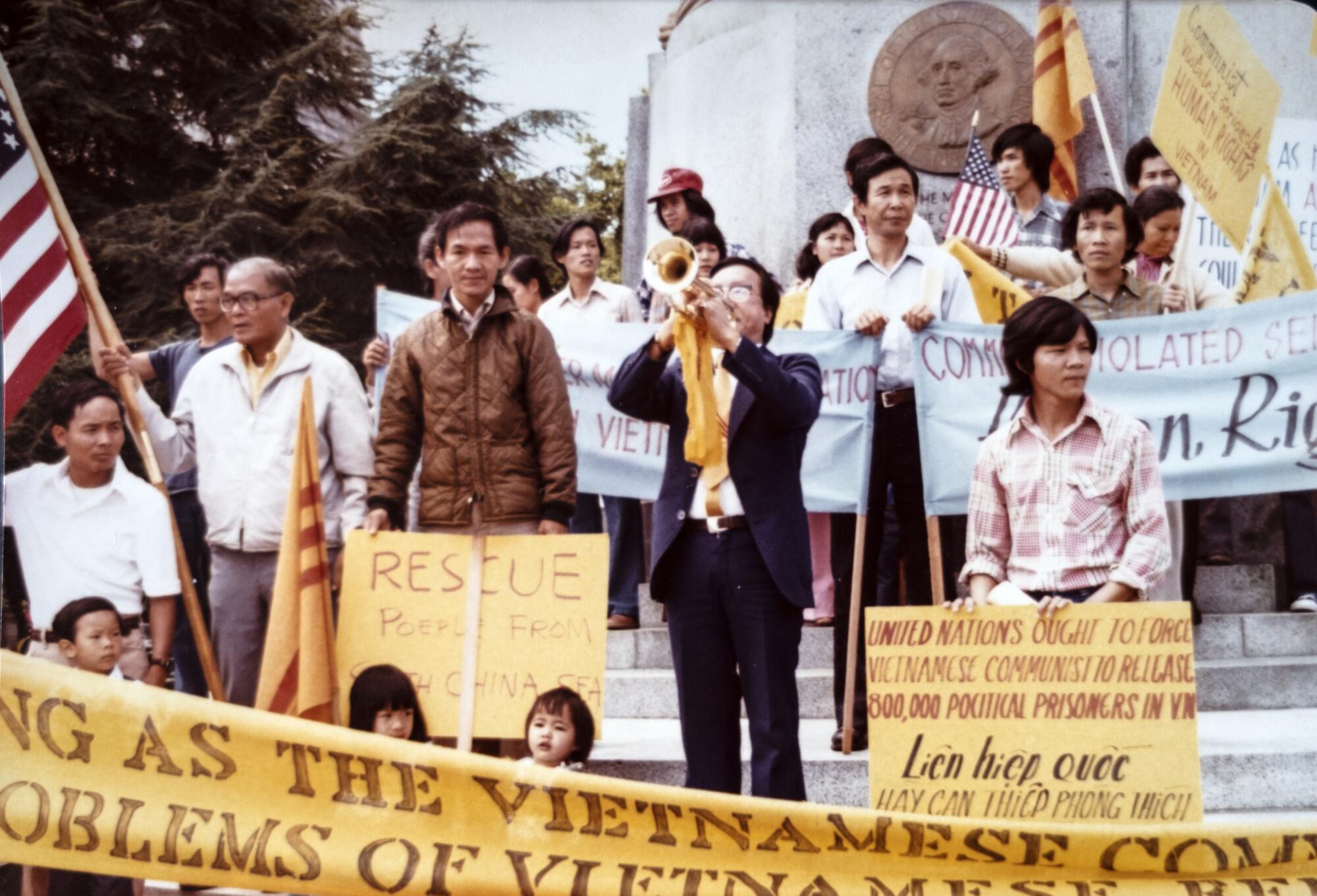
When they got to Washington, there was already a robust Vietnamese community following the first group of refugees who’d responded to a 1975 invitation from then-Gov. Dan Evans. Evans’ welcoming stance came, in part, as a response to California Gov. Jerry Brown’s initial opposition to resettling refugees. (In the years that followed, however, tens of thousands of Vietnamese built lives in Southern California, most notably in Orange County.)
Nearly 500 Vietnamese refugees arrived in Washington in May 1975, and the state now has more than 100,000 residents of Vietnamese descent.
“We saw that open hand to our community,” Tan said. “We have to give back. …This community is known for its openness to immigrants.”
On a recent soggy evening, Tan and other members of Viets for Afghans huddled at a Vietnamese restaurant in downtown Seattle. Over steaming bowls of pho, they mapped out a plan for the group’s official launch as a sponsor circle.
Since August, the group had raised more than $15,000 online, and its website shows side-by-side images of Vietnamese refugees boarding helicopters in the 1970s and hundreds of Afghans packed into a military plane departing Kabul. To date, the group has helped three Afghan families.
Jefferey Vu, an engineer at Boeing, is a member of the group. His dad, fleeing Vietnam along with his own parents and his nine siblings, arrived at Camp Pendleton in 1975. They were housed at the San Diego County Marine base before being resettled in the Seattle area.
After a background check and vetting, Vu recently temporarily moved out of his downtown Seattle apartment, which has become the home of a woman who recently fled Afghanistan. Vu, who is still paying rent on his apartment, is living with his girlfriend and other family for now.
“That history sticks with me today. It’s full circle,” Vu said. “In America, you can pay it forward. … That’s what we hope to do.”
::
During the early years of Do’s childhood, her family’s life centered on efforts to leave Vietnam. Soon after the war ended but before Do was born, her parents had sought to escape by boat, but they struggled and had to turn around. In the years that followed, they made two more failed attempts to leave.
They gave up for a while, but in 1991, through a government program, Do, her parents and her three siblings finally flew to the U.S., moving into a small house in south Seattle, where many other Vietnamese families — including extended family of their own — already lived. Do was 9.
“My family knew a lot of people,” she said. “There was support from family and other refugees like us.”
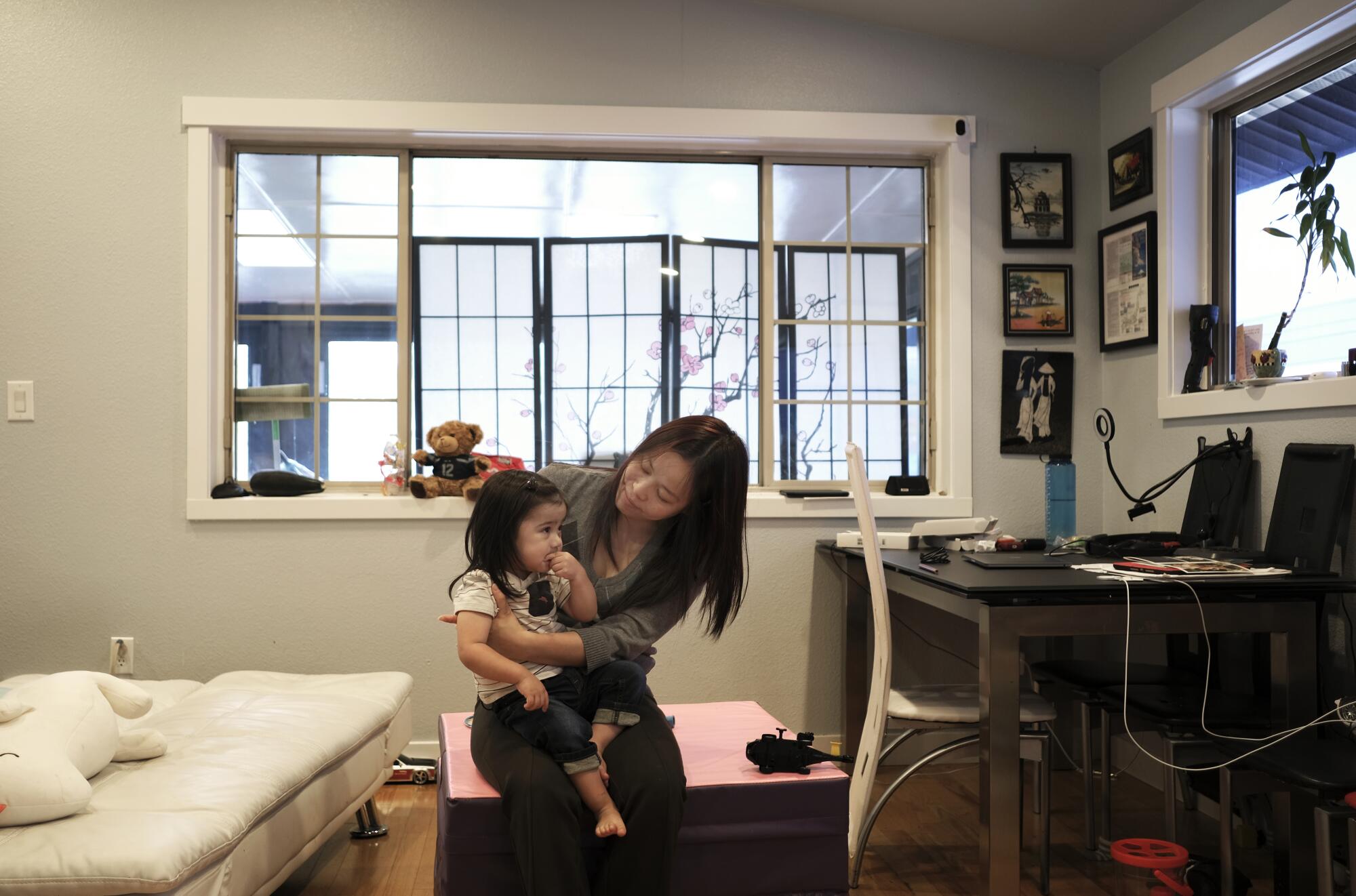
Seattle became home — the city where she went to elementary school, middle school, high school and college. She made friends, got married and graduated from the University of Washington School of Medicine in 2010. She and her husband began a family and she started her own private practice in south Seattle, now home to immigrants from Vietnam, the Philippines and East Africa.
“I’ve built a life here,” she said on a recent afternoon in her living room with her husband, Jesse Robbins, a self-defense instructor, seated next to her. “Many of my friends, many of my patients are immigrants like myself.”
Robbins, who knows Vu through community activist circles, heard from him about the early efforts of Viets for Afghans.
Robbins and Do knew that shelter would be the top priority for the thousands of Afghan refugees headed to the U.S., and they knew they were in a position to help. They own two houses — the one they live in and a vacant three-bedroom property a few blocks away that they would occasionally rent out short-term.
“It all came together really fast,” Robbins said.
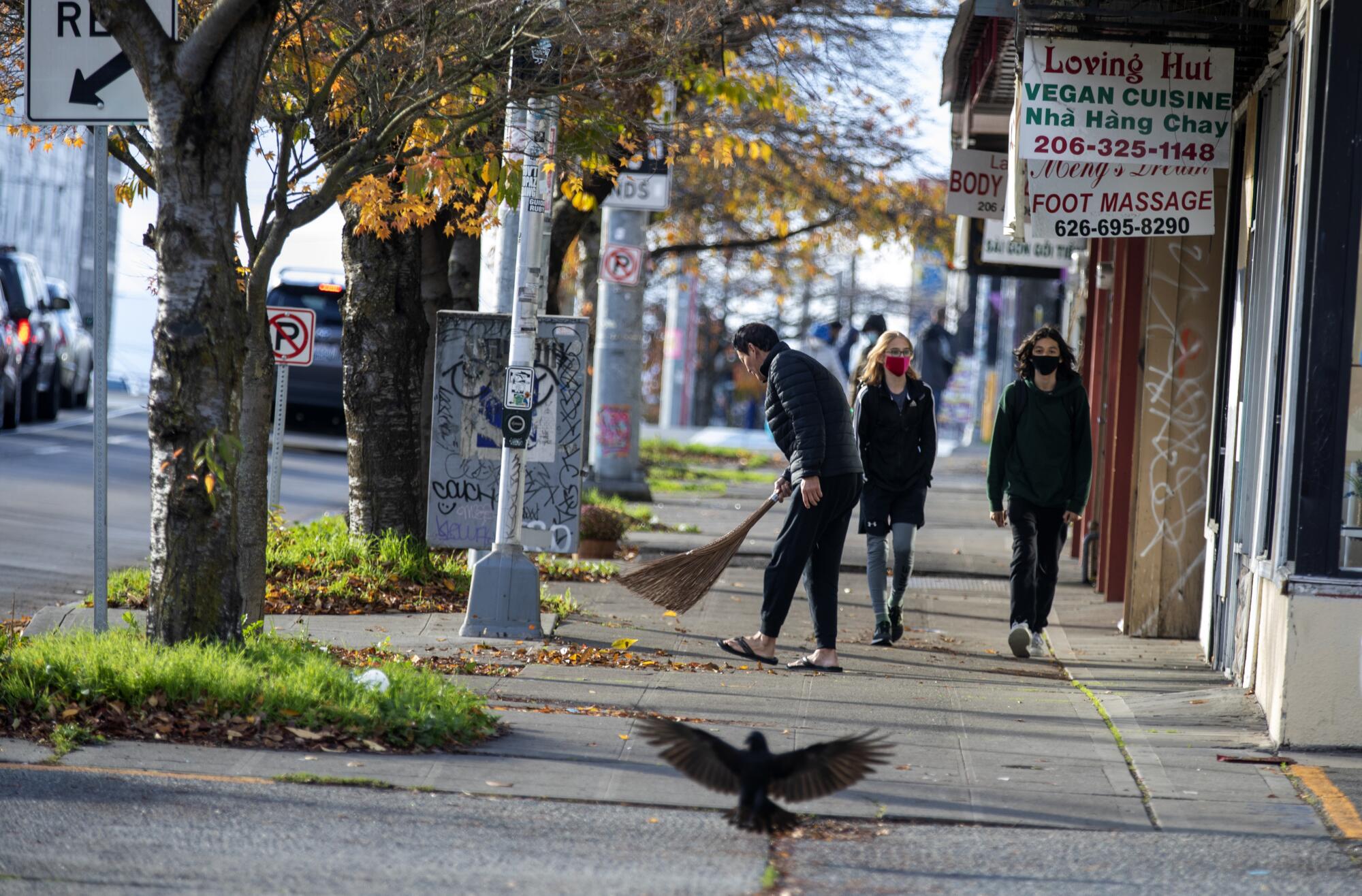
In early September, they reached out to several groups, including the local Jewish Family Service, which has worked alongside resettlement agencies in finding housing for Afghan families. Within a few days, after background checks and paperwork were cleared, the group placed an Afghan couple and their six children in the vacant home.
The family stayed only a week before a resettlement agency found them a new house. Then the couple got a message from World Relief, a global Christian humanitarian organization based in Baltimore that is among the resettlement agencies approved by the federal government. Another family urgently needed housing and would be arriving in Seattle soon.
::
The only life Qadiri knew was on the streets of Kabul.
He was there when U.S. forces invaded Afghanistan in 2001, and in the years that followed, as he started a family and grew familiar with the constant background noise of Humvees and Chinook helicopters.
Over the years, Qadiri worked as a mechanic on U.S. military vehicles. He forged friendships and felt a sense of camaraderie with Americans, who he believed were genuinely trying to help his country.
In 2018, he applied for a special immigrant visa, the first step toward a then far-off dream of one day moving to the United States. The process took three years and he finally received his visa earlier this year, he said. He knew the U.S. planned to withdraw, but he didn’t expect the Taliban to quickly conquer the country.
“It all became very chaotic,” he said.
Qadiri arrived at the Kabul airport on Aug.18, three days after the Taliban takeover. It was just after 11 p.m. when he and his wife and their four children finally made it into the terminal because of the visa. They slept inside the airport, curled up in tattered blankets. Outside, thousands more pushed toward entry points frantically trying to get in.
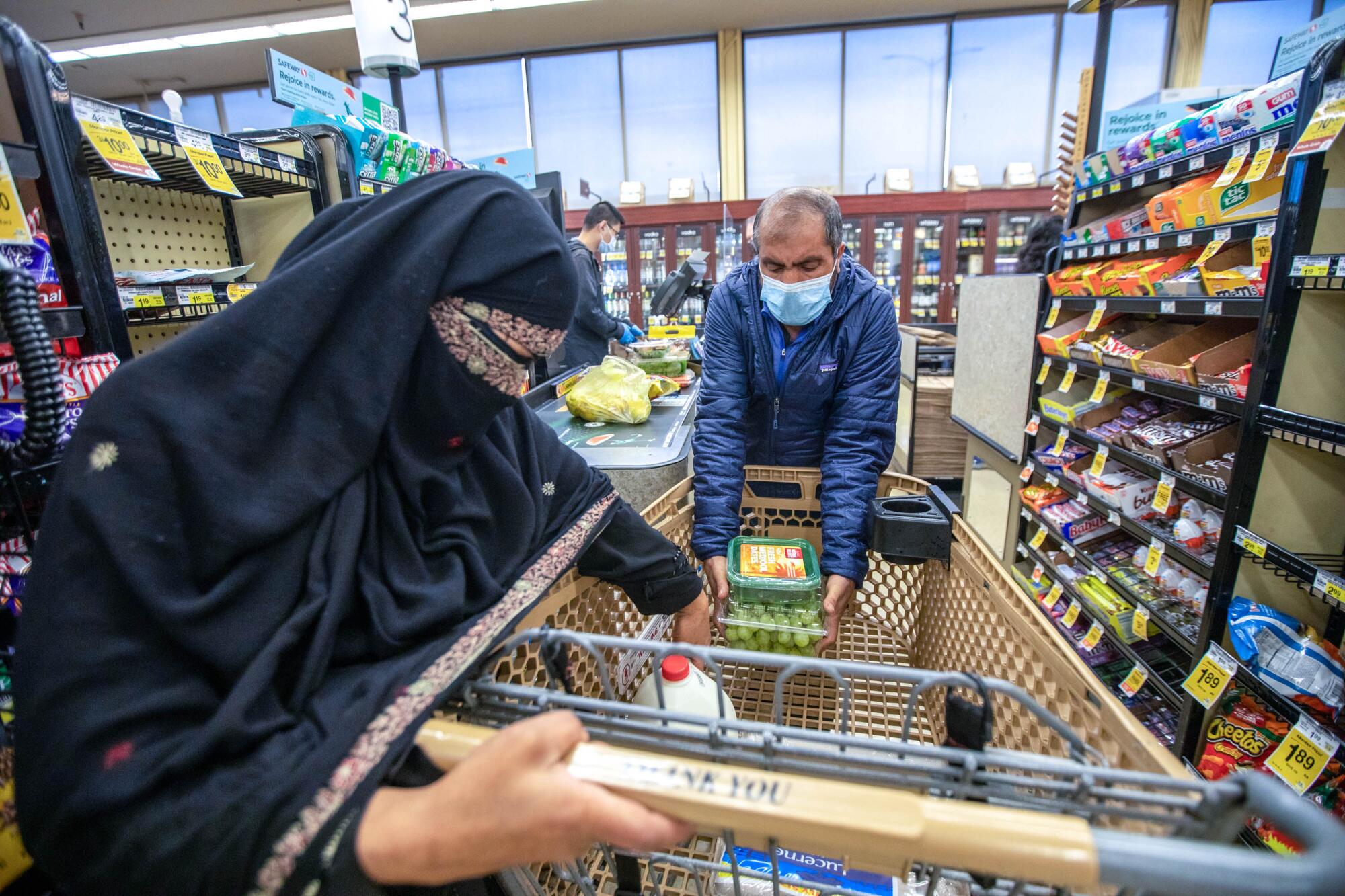
Soon, the family members would board a hulking plane bound for Qatar, where they spent seven days, before being flown to Washington Dulles International Airport. Qadiri was exhausted. The family tested negative for the coronavirus.
“It was draining,” Qadiri said through an interpreter, who speaks Dari. “But we were finally in America, so there was joy.”
The next leg of their trip brought them to Seattle and then, with help from World Relief, to Do’s spare residence.
They arrived at the two-story blue house on a chilly, overcast morning in September.
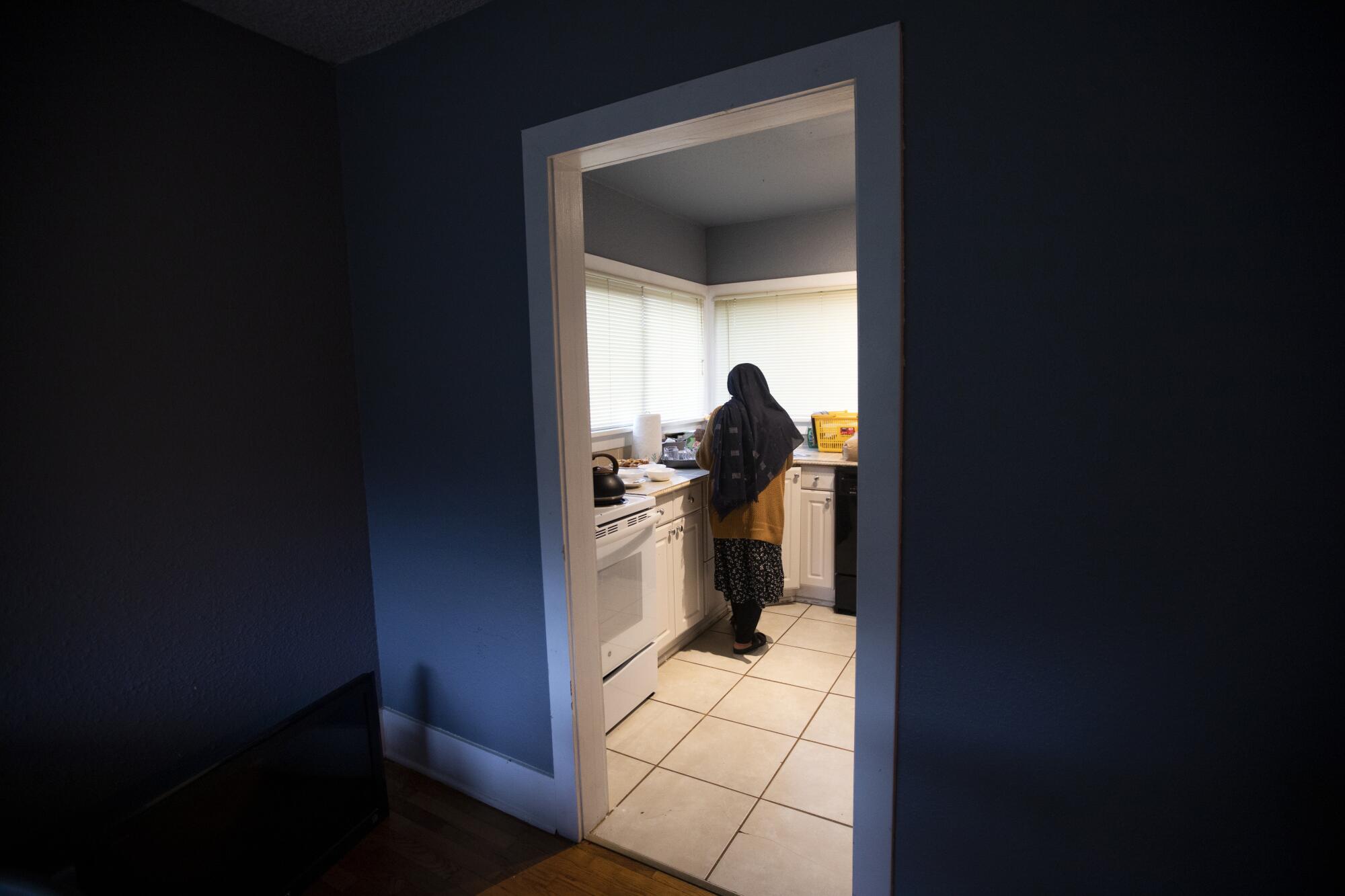
“I’m just grateful to be out of Afghanistan,” Qadiri said on a recent morning. He wore a long-sleeved shirt emblazoned with the word “Army,” for the U.S. military branch, and spoke with an ease that he said he hadn’t felt in a long time. A steady rain fell outside as he lounged on the living room couch.
Qadiri has distant friends who live in Kent, Wash., and Renton, Wash., both suburbs of Seattle where sizable Afghan immigrant populations reside.
“That,” he said, “gives me peace and ease.”
::
Since Qadiri and his family arrived, Do has tried to give them space. The COVID-19 pandemic lingers and the shock of leaving their home country so quickly can be a lot, she imagines.
They live a mile apart in a neighborhood lined with Ethiopian and Vietnamese grocery stores, as well as a light rail train that cuts through its core, shuttling passengers between Seattle-Tacoma International Airport and downtown.
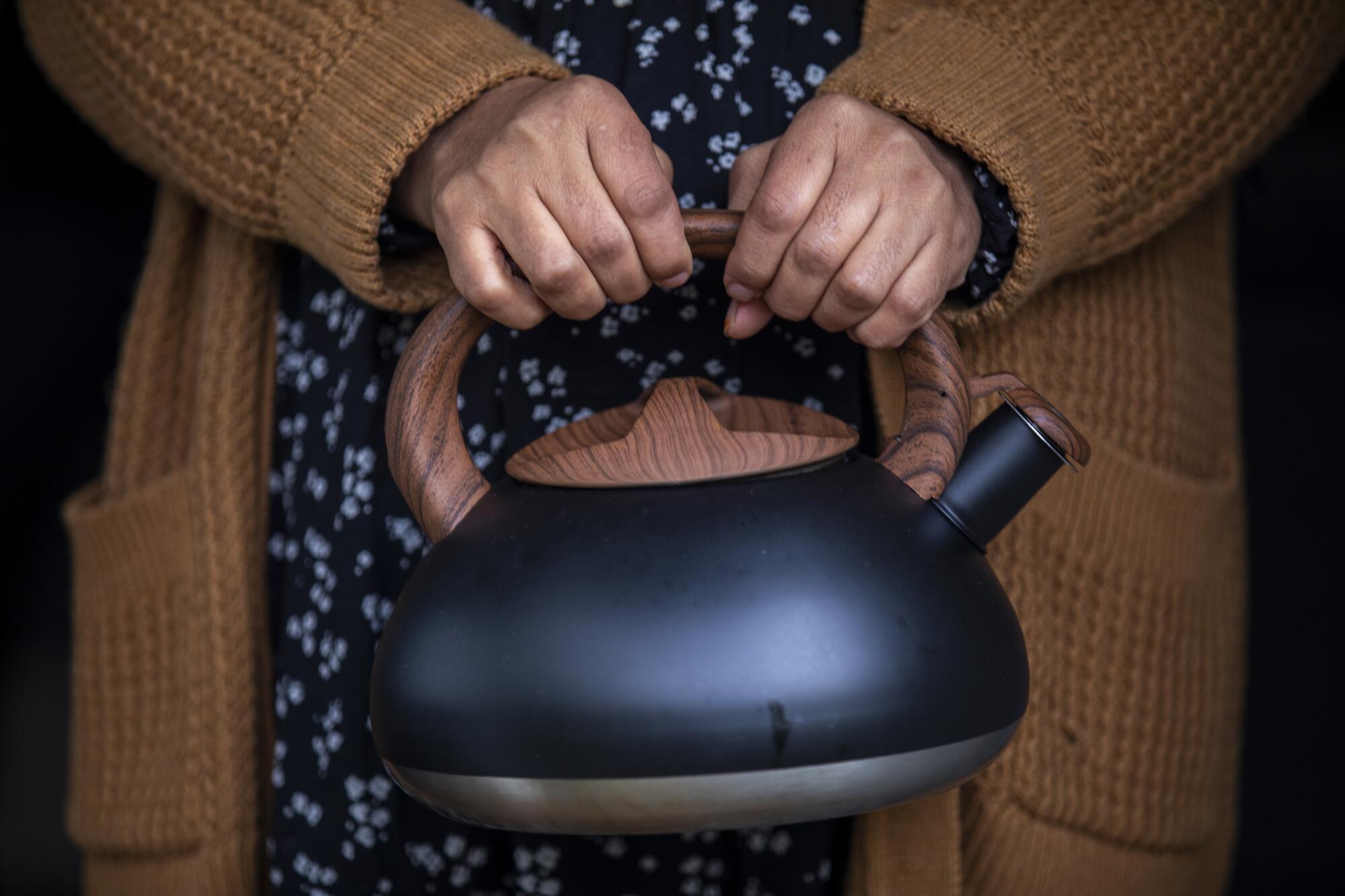
In recent weeks, Do has stopped by briefly to deliver sweaters and heavy jackets so the family can stay warm in the damp winter weather. She also dropped off an extra television and tea kettle.
“We just want them to be comfortable,” she said, noting that a language barrier — Qadiri speaks mostly Dari — makes even short conversations difficult.
A social worker has been assigned by World Relief to help Qadiri find permanent housing — hopefully an apartment in Kent, he says, near the friends he knows from Kabul.
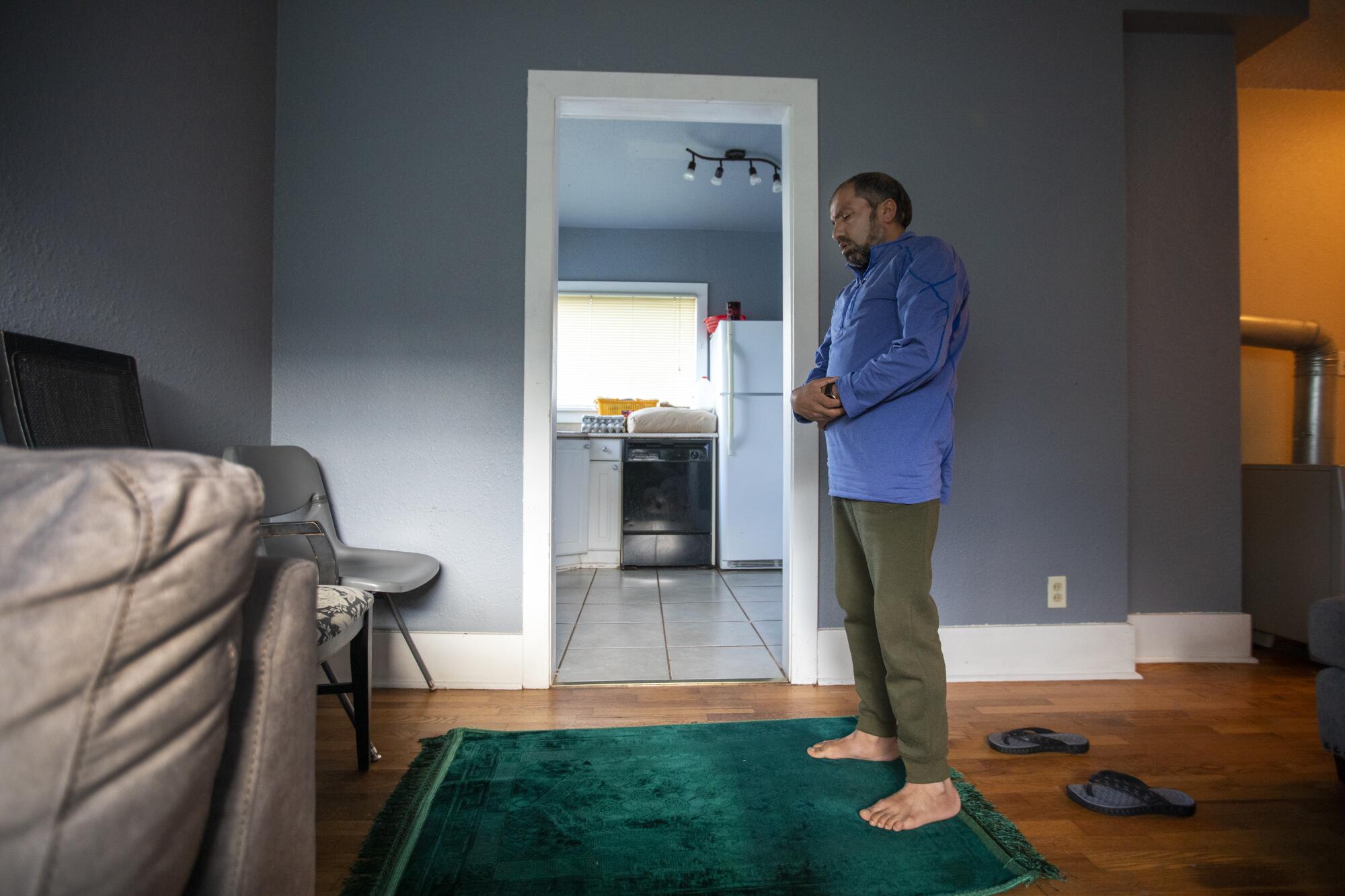
Some days, he tries to catch up on the news in Afghanistan. He sees that the Taliban is raiding homes of citizens who helped Americans during the war. He tries his best to look forward, not back — at least not right now, when everything is so new.
“I am slowly building a new life,” he said.
Most days, he stays inside the house. He prays. He hasn’t seen much of Seattle, he says, because he doesn’t have a car or a driver’s license. Once a week, he walks to the nearby Safeway to purchase groceries with aid from World Relief. His wife bakes naan and the family eats dinner together. He wants to become a mechanic in the Seattle area and has started to look for work.
“Soon, I need to work,” he said. “That is the American way — work hard and good will happen.”
One day this month, Qadiri and his family moved out of Do’s house. A new family, through Viets for Afghans, soon arrived.
More to Read
Sign up for Essential California
The most important California stories and recommendations in your inbox every morning.
You may occasionally receive promotional content from the Los Angeles Times.
